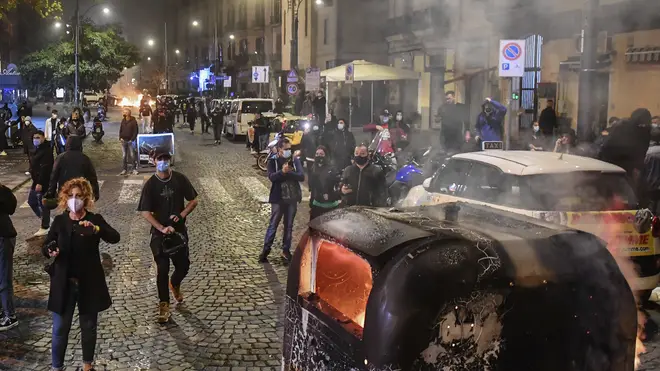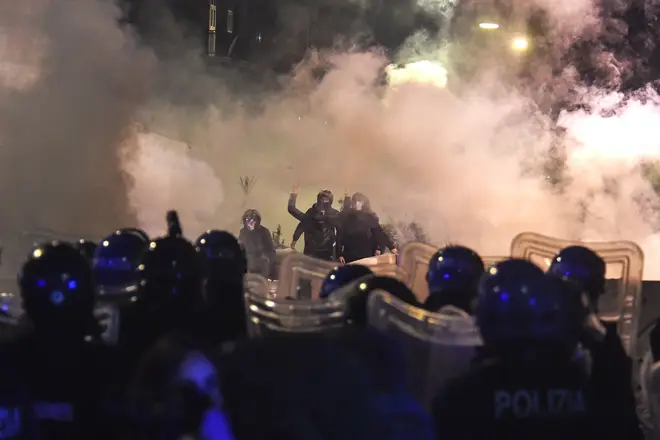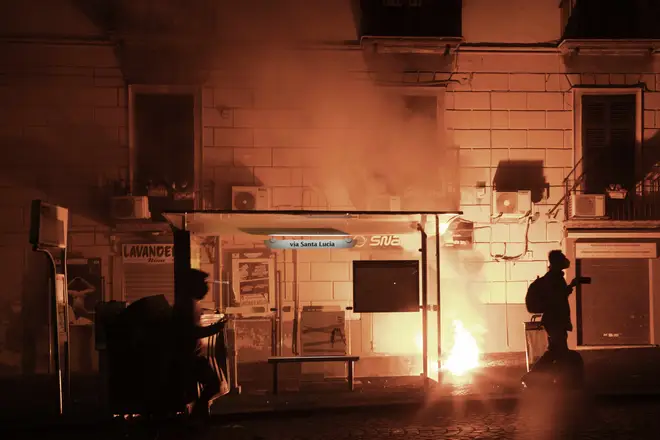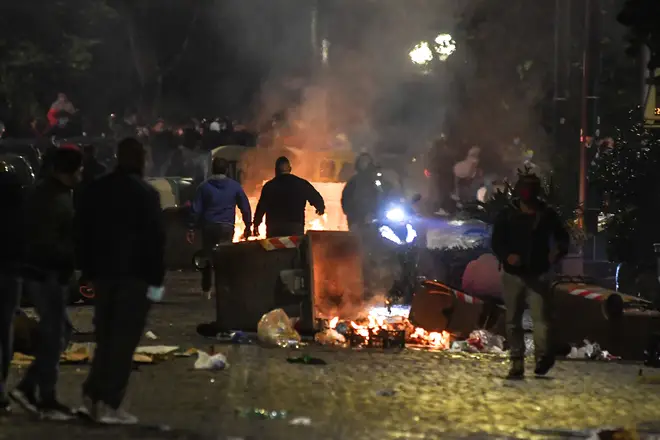
Nick Abbot 10pm - 1am
24 October 2020, 10:23

Violent protests have erupted in Naples, Rome and Barcelona overnight against new Covid restrictions brought in to curb the rising second wave of cases in Europe.
Italy's three largest cities face new curfews as regional authorities try to slow the spread of Covid-19 where it first struck hard in Europe.
A midnight to 5am curfew in the Lazio region, which includes Rome, begins on Friday and lasts for 30 days, under an order signed by regional governor Nicola Zingaretti - who himself became seriously ill with Covid-19 early in the pandemic.
The governor of Campania, the southern region that includes densely populated Naples, has ordered residents to stay at home from 11pm to shortly before dawn, starting on Friday.
Read more: Travel firms celebrate surge in Canary Islands bookings after restrictions eased
Read more: South Yorkshire enters Tier 3 coronavirus restrictions

A similar curfew in Lombardy, where infections are particularly surging in its main city, Milan, will go into effect on Thursday night.
Italian media reported several hundred demonstrators gathered in Naples on Friday with reports said some people were throwing rocks and smoke bombs at police.
Campania has gone into a fresh coronavirus measures amid rising cases across the country, including an 11pm to 5am regional curfew.
Read more: Government to deliver £75m bailout for major cultural organisations
Read more: Police to patrol routes out of Wales during firebreaker lockdown
New cases in the country rose to over 19,000 on Friday, more than in the first few weeks of the pandemic last spring when the government ordered a lockdown.
More than 37,000 people have now died in Italy from the Covid-19.

Elsewhere in Italy, businesses in Rome expressed their anger at a new 9pm curfew aimed at limiting the spread of the virus.
Restaurant owners, forced to close before 9pm, displayed signs with crosses on them pronouncing their business "dead" due to the new measures.
Prime Minister Giuseppe Conte has said he wants to avoid a new national lockdown that would wreck the already fragile economy.
However, Italian law gives regional leaders leeway to establish their own curbs, and several regions are taking matters into their own hands.
“Current data on the contagion make any kind of partial measure ineffective. We have to close everything, except for those businesses that produce and transport essential goods,” Vincenzo De Luca, the head of Campania, said on Facebook.
“We need to make one last effort to get things under control. We need to shut everything down for a month, for 40 days,” he added, without saying when the shutdown would begin.
Italy was Europe's first country to be put under a national lockdown in March.

While in Barcelona nightclub owners honked car horns in protest against latest restrictions.
Spanish authorities contended with demonstrators blaring music in front of the Catalan regional government building, expressing their anger and asking for more economic assistance for one of the sectors most severely affected by the pandemic.
Restaurants and bars have been ordered to shut since October 14 and are allowed only to serve meals for take away or delivery.
Elsewhere in Europe, the number of new daily coronavirus cases in Germany remains near a record high, as the pandemic continues to spread, according to the country's disease control centre.
The Robert Koch Institute said that 11,242 new cases were reported over the last 24-hour period, just shy of the record 11,278 mark set the day before.
The nationwide infection rate over the last seven days rose to 60.3 cases per 100,000 residents, up from 56.2 the day before.
Some hotspots, such as the capital, are much higher than that, with Berlin reporting a rate of 110.6 cases per 100,000 residents, with the district of Neukoelln at more than double that with a rate of 236.7 per 100,000.
The health ministry, which said earlier this week that health minister Jens Spahn had tested positive for coronavirus and was in quarantine at home exhibiting cold-like symptoms, announced on Friday that his husband, Daniel Funke, had also tested positive.
It said Mr Funke tested positive on Thursday morning and was symptom-free, but had been in quarantine with Mr Spahn since Wednesday afternoon.

Italy in lockdown as coronavirus restrictions extended nationwide
And the hard-hit Czech Republic's health minister is under fire to resign after a media report that he broke strict government restrictions and visited a Prague restaurant.
The Blesk tabloid daily said Roman Prymula met Jaroslav Faltynek, deputy head of the senior government ANO (YES) movement led by Prime Minister Andrej Babis, on Wednesday night.
Amid tight restrictions, restaurants, bars and schools are closed. The meeting took place just hours after Mr Prymula announced the latest series of regulations, including a limit on movement and the closure of many stores.
The junior government coalition party, the Social Democrats, joined the opposition to demand Mr Prymula's resignation, calling his behaviour "absolutely unacceptable". In photographs, Mr Prymula did not wear a mandatory mask.
Mr Faltynek said he asked Mr Prymula to meet to discuss an extraordinary parliament session that is set to approve a plan for Nato military medical personnel to come to the Czech Republic to help with the outbreak.
The Czech Republic has been facing record coronavirus infections that put the health system under pressure. The health ministry said daily confirmed cases reached 14,151 on Thursday, after the record of almost 15,000 the day earlier.
In Belgium, Prime Minister Alexander De Croo stopped short of imposing another full lockdown on Friday, as the country did in March, but introduced a series of new restrictive measures as the number of coronavirus-related hospital admissions and deaths continues to soar.
Already severely hit during the first wave of the pandemic, Belgium is now the second-worst country in the European Union in terms of coronavirus infections per 100,000 inhabitants.
"We want to ensure that our doctors and hospitals can keep doing their work, that children can continue attending schools and that businesses can continue working while preserving as much as possible the mental health of our population," Mr De Croo said as he unveiled the new restrictions.
Belgium had already introduced a list of measures aimed at slowing infections, including a night-time curfew and closing bars and restaurants. Visits at nursing homes have also been limited, but many health experts think the new curtailment will not be enough to break the contagion chain.
"We were told strong and hard measures would be announced, we don't see them," said epidemiologist Yves Coppieters.
According to the latest official figures, some 10,000 new people are infected on a daily basis by the virus, which has already killed more than 10,500 people in the small nation of just 11.5 million.
The health situation is so dramatic in nine out of 10 of Belgium's provinces that authorities have recently warned intensive care units will hit their capacity by mid-November if new coronavirus cases continue to soar at the same pace.